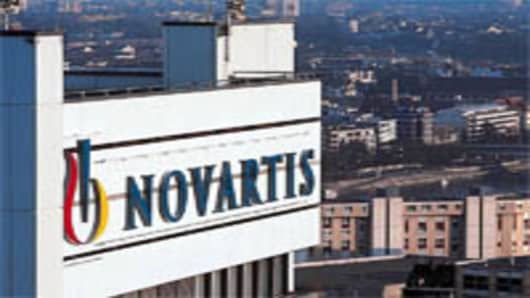Swiss drug maker Novartis said Thursday its fourth-quarter profit fell sharply, mainly due to restructuring costs, but that it would increase returns to shareholders with a new buyback program and an increase to its dividend.
Shares of the Novartis closed 3.4 percent lower after the No. 2 European pharmaceutical company said quarterly net profit fell 42 percent to $931 million, missing forecasts as generic competition also weighed on results.
Fourth-quarter group sales from continuing operations rose 6 percent to $9.93 billion. But sales at the firm's vaccines and diagnostics unit fell 13 percent to $398 million, as seasonal influenza vaccines were delivered mainly in the third quarter.
Novartis had been expected to post net profit of $1.48 billion in the fourth quarter and sales of $9.67 billion, according to a Reuters poll.
It broadly maintained its existing outlook, saying it expected group sales to rise at a mid single-digit rate in 2008, with drugs sales increasing at a low single-digit rate.
"One has to be aware that the first quarter of 2008 for pharmaceuticals will be weak and that is on the base of a very strong first quarter of 2007," Daniel Vasella, CEO of Novartis, told "Squawk Box Europe." "And then the second quarter will be neutral and then the third will be growth and the fourth will be very dynamic growth of pharmaceuticals."
But Denise Anderson, drug analyst at Landsbanki Kepler, said she was skeptical about the company's prospects for a lasting turnaround.
While Novartis won't have major patent expirations until 2010, "competitive drugs do see patenet expirations and on that side we see risks" of patients switching to generic versions of rival treatments, Anderson told "Squawk Box Europe."
If that happens, w"e could already see another slowdown in 2009 for Novartis," she said.
Novartis suffered a series of setbacks in 2007, including delays to important drugs like Galvus for diabetes and the withdrawal of bowel treatment Zelnorm in the United States.
In response, it cut 2.5 percent of its workforce, aiming for annual savings of $1.6 billion in 2010, and taking a charge of $450 million in the fourth quarter for the measures.
"Results are significantly below expectations," said Karl-Heinz Koch, an analyst at Vontobel. "The big disappointment comes from pharma and that raises questions about whether they will meet their future estimates."
Buyback and Dividend Hike
Novartis also announced a 10 billion Swiss franc ($9.20 billion) buyback program, to be put up for shareholder approval in February. In addition it proposed a 2007 dividend of 1.60 francs, up 19 percent.
"I would say that shareholders in general are more short-term oriented than they used to be and the turnover of shareholders also changes," Vasella said. "We have faster turnover of ownership, and obviously their perspective becomes more short-term oriented. And I think it’s the role of the board to really have a clear a clear strategy and to balance the short versus the long term and make an informed decision (on shareholder return)."
But the response from analysts was not enthusiastic.
"People would like to see a better use for the cash pile building up in this company," Anderson said.
Shares in Novartis lost 12 percent of their value in 2007, in line with the European drugs sector.
Its shares trade at about 15 times forecast 2008 earnings, according to Reuters data, just behind local rival Roche but ahead of other European drug majors, GlaxoSmithKline , Sanofi-Aventis and AstraZeneca
.
-- Reuters contributed to this report




